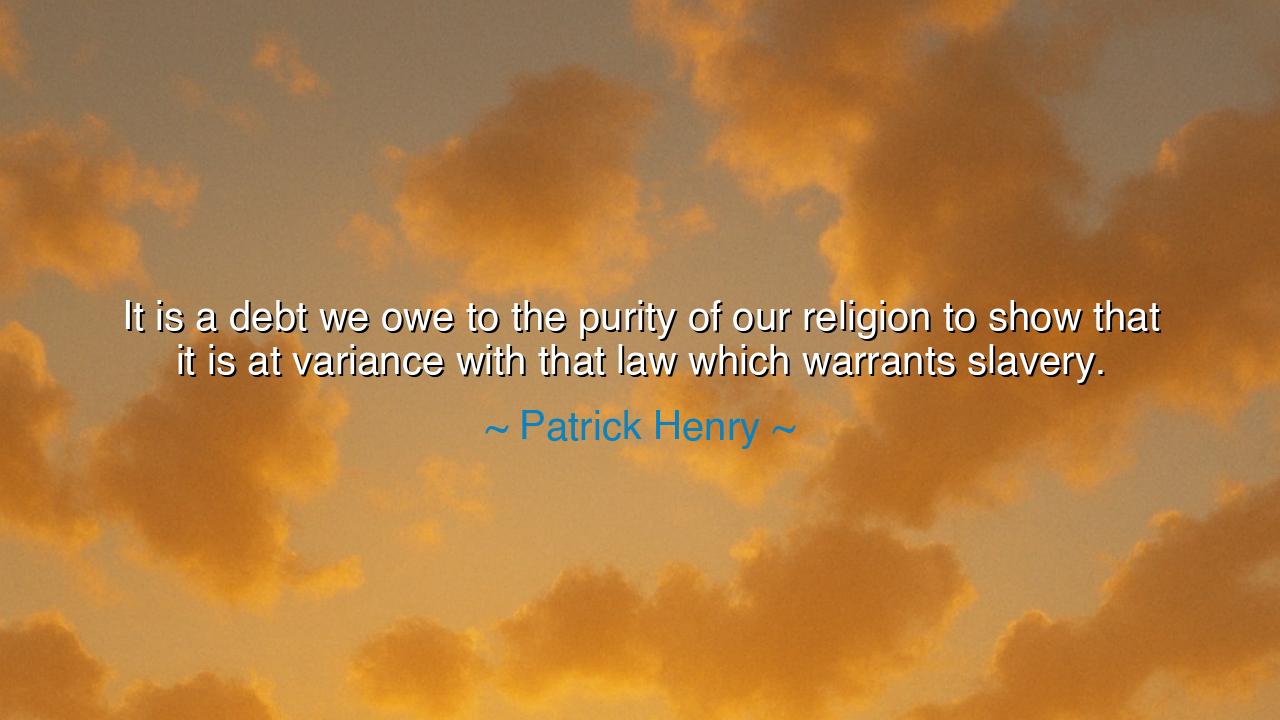
It is a debt we owe to the purity of our religion to show that it
It is a debt we owe to the purity of our religion to show that it is at variance with that law which warrants slavery.






In the moral fabric of a society, there is a deep and enduring truth that resonates through the ages, a truth that calls upon us to examine the purity of our beliefs, particularly when those beliefs stand in stark contrast to the actions we take. Patrick Henry’s powerful words—"It is a debt we owe to the purity of our religion to show that it is at variance with that law which warrants slavery"—are a call to action and reflection. These words, spoken in a time of great social and political turmoil, remind us that true religion must always uphold the principles of justice, equality, and freedom, and that when it aligns itself with systems of oppression, it has strayed from its divine mandate. For Henry, the struggle against slavery was not only a political or legal matter—it was a spiritual duty to ensure that the sacred teachings of faith were not tainted by the evils of human enslavement.
The ancient wisdom of many of the world’s religions has always emphasized the dignity of the human soul. The Judeo-Christian tradition, which was influential in shaping the ideals of Western civilization, calls for love and compassion, and teaches that all people are created in the image of God and are worthy of freedom and justice. From the time of the Exodus, where the Israelites were liberated from slavery in Egypt, the concept of freedom has been deeply entwined with the spiritual journey. The notion that any person should be owned or treated as property runs counter to the very essence of what it means to be human—to be a child of the divine. Thus, Henry’s words remind us that to remain true to our religion, we must stand against the moral corruption of practices like slavery that strip away human dignity and freedom.
History offers us ample examples of men and women who, when faced with the moral challenges of their time, chose to follow the higher calling of their faith. Take, for instance, the story of William Wilberforce, a member of the British Parliament who, moved by his Christian faith, devoted his life to the abolition of the slave trade. His fight was not just political but deeply moral, grounded in his belief that the Christian faith could not condone the enslavement of fellow human beings. Like Patrick Henry, Wilberforce saw the institution of slavery as a blasphemy against the moral teachings of his religion, and he waged a tireless campaign to end it, culminating in the Abolition of the Slave Trade Act of 1807.
In the American colonies, Patrick Henry himself, though deeply embedded in the fabric of early American politics, was influenced by his own religious convictions in speaking out against the moral evil of slavery. As a Virginians, where slavery was deeply entrenched, Henry knew that the fight for independence from Britain had to be coupled with a moral reckoning about the institution of slavery that marred the fabric of the new nation. He understood that to stand for freedom and self-determination—the very principles that were being fought for in the Revolution—one could not simultaneously justify the bondage of others. His belief that slavery was a stain on the purity of religion showed his commitment to ensuring that the new republic would stand for moral integrity as much as it did for political freedom.
The lesson that Henry’s words impart is not only relevant to his time but to our own. We are continually faced with the challenge of ensuring that our faith and values are not only practiced in the privacy of our hearts but are also evident in the way we engage with the world. Just as slavery was a contradiction to the moral foundations of religion, so too are any systems that oppress or disempower others. Whether it be the oppression of the marginalized, the denial of basic human rights, or the exploitation of the weak, we must be ever vigilant that our beliefs do not become convenient justifications for injustice.
In our own lives, let us heed the example of Patrick Henry and William Wilberforce. Let us not shy away from standing against the moral contradictions we see in the world today. We must not remain silent when we witness injustice, whether in our own communities or on a global scale. Like the men of faith before us, let us challenge the structures that perpetuate inequality and oppression, guided by the purity of our religion and the deep truths it espouses. We have a duty to ensure that our faith is not just a personal refuge but a transformative force in the world, a force that calls us to act with courage, integrity, and compassion for the freedom and dignity of all people.
Finally, we must remember that true religion is not about blind adherence to ritual or tradition, but about living in accordance with the highest moral standards, those that protect human dignity and promote justice. In the spirit of Patrick Henry, we must ask ourselves: How do our actions, both as individuals and as members of society, reflect the moral imperatives of our faith? Let us act boldly, as those before us have done, to ensure that the purity of religion continues to shine brightly, bringing justice, equality, and freedom to all.






AAdministratorAdministrator
Welcome, honored guests. Please leave a comment, we will respond soon